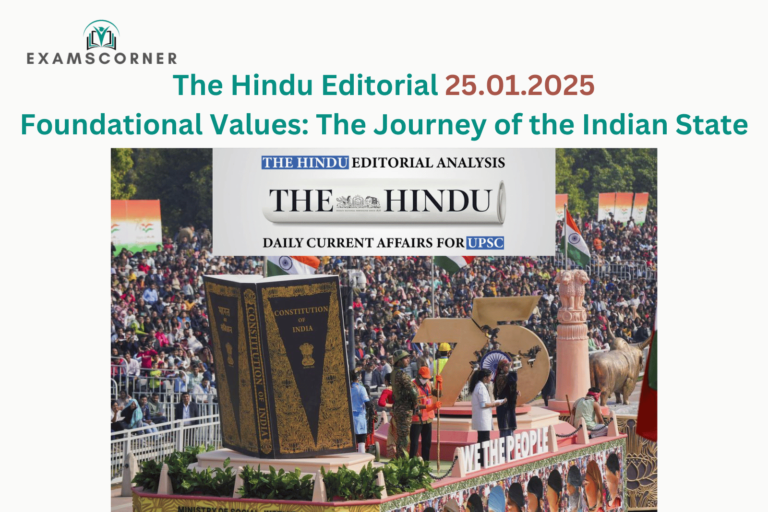As India celebrates 75 years of the Constitution coming into effect, it is a moment to reflect on the foundational values that have shaped the Indian state. The adoption of the Constitution marked a monumental moment in India’s journey as a sovereign democratic republic. However, as we move forward, the question remains: are we upholding the ideals of liberty, equality, and fraternity envisioned by the architects of the Constitution? Dr. B.R. Ambedkar’s closing address to the Constituent Assembly on November 25, 1949, serves as a timeless reminder of the challenges ahead. He warned of the need to place the country above individual or communal interests—a lesson that resonates strongly even today.
The Federal Republic: Challenges and Debates
Tussles Between State Governments and Governors
India’s federal structure has been at the center of recent constitutional debates. Conflicts between State governments and Governors have escalated to the Supreme Court, highlighting the complex dynamics of federalism.
Simultaneous Elections
The proposal for simultaneous elections has triggered intense discussions both within and outside Parliament, raising questions about practicality and fairness.
Neglect of Regional Languages
The marginalization of regional languages, such as Tamil, Kannada, Bengali, and Marathi, has reignited debates about multilingual equality and the autonomy of States.
Fiscal Federalism
Fiscal federalism remains contentious, with States grappling with the dual mechanisms of the Finance Commission and the Goods and Services Tax (GST) Act.
Delimitation and Representation
The upcoming delimitation exercise is expected to further strain the Union-State relationship, particularly for States that have successfully controlled their population growth.
Federalism and the Constitution
Interestingly, despite the significance of federalism in shaping the Indian state, the word “federal” is conspicuously absent from the Constitution. Early criticisms labeled the Constitution as anti-federal, favoring the Union. Dr. Ambedkar clarified in 1949 that the Centre and States are co-equal in legislative and executive authority, with the Union’s overriding powers intended for emergencies only.
Landmark judgments such as S.R. Bommai vs Union of India (1994) and Government of NCT of Delhi vs Union of India (2024) have affirmed federalism as a basic feature of the Constitution.
An Unequal Democracy: Liberty and Fraternity at Stake
Contemporary Concerns
India’s journey as a social democracy remains fraught with challenges. Critics argue that the country has tilted toward becoming a “police state,” with laws like the Unlawful Activities (Prevention) Act (UAPA) and the Prevention of Money Laundering Act (PMLA) being used to curb dissent.
Equality and Fraternity
Dr. Ambedkar envisioned a nation that eradicates social and economic inequalities to safeguard democracy. Yet, caste remains a determining factor in societal success, and the goal of fostering fraternity remains elusive.
While these shortcomings do not imply a failure of the Constitution, they underscore the distance India must traverse to realize its foundational values fully.
Guarding the Constitution
Colonial Accusations and ‘Indic’ Alternatives
Recent calls to overhaul the Constitution in favor of an “Indic” framework based on Hindu dharmic principles have sparked debate. Proponents argue that the current document is rooted in a colonial perspective. However, such proposals undermine the intellectual labor of the Constituent Assembly and 75 years of nation-building.
Dr. Ambedkar’s Warning
Dr. Ambedkar’s appeal to defend democratic principles remains more relevant than ever. Rather than rewriting the Constitution, the focus should be on preserving its essence and addressing contemporary challenges with integrity.
The Role of Constitutional Guardians
India needs guardians of the Constitution—judges, bureaucrats, politicians, activists, journalists, and citizens—who prioritize the country above personal or communal interests. Plato’s vision of philosopher-kings as guardians of a just society finds resonance here. Only with clear-headed guidance and an unwavering commitment to constitutional values can India aspire to fulfill the promises of its founding document.
Conclusion
The Constitution of India is not merely a document; it is a living embodiment of the country’s ideals. As we chart the course for the next 75 years, we must recommit to the principles of liberty, equality, and fraternity. The journey of the Indian state is far from over, but with steadfast guardians and an informed citizenry, the nation can continue to uphold and strengthen its democratic fabric.



